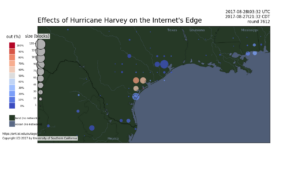PCMag released a news story on January 3, 2018 about our measuring Internet outages, including discussion about the 2017 hurricanes like Irma, and our new worldwide outage browser.
Category: In-the-news
On August 25, 2017 Hurricane Harvey made landfall in south Texas, causing widespread property damage, displacing more than 30,000 people, and costing more than 45 lives (as of 2017-09-01).
We sympathize with those were hurt by this disaster, and hope for swift recovery for the region.
We recently examined the effects of Hurricane Harvey on the area using Trinocular, our internet outage detection system. Two key results:

We see that landfall was followed by widespread Internet outages in the Corpus Christi area, with 40% or more home networks dropping off the Internet.
We see that over the following days, network outages grew in the Houston area, with many networks dropping off the Internet. However, the fraction of networks lost in Houston was much smaller than in the Corpus Christi area.
More details are on our Hurricane Harvey web page. We will update that page as we get more data in.
The dataset including Hurricane Harvey will be internet_outage_adaptive_a29all-20170702 and will be released in October 2017. Until the full data is released, we have a preliminary dataset through August 2017 available on request.
The Internet RFC-7858, “Specification for DNS over Transport Layer Security (TLS)”, was just released by the ITEF as a Standards Track document.
From the abstract:
This document describes the use of Transport Layer Security (TLS) to provide privacy for DNS. Encryption provided by TLS eliminates opportunities for eavesdropping and on-path tampering with DNS queries in the network, such as discussed in RFC 7626. In addition, this document specifies two usage profiles for DNS over TLS and provides advice on performance considerations to minimize overhead from using TCP and TLS with DNS.
This document focuses on securing stub-to-recursive traffic, as per
the charter of the DPRIVE Working Group. It does not prevent future applications of the protocol to recursive-to-authoritative traffic.
This RFC is joint work of Zhi Hu, Liang Zhu, John Heidemann, Allison Mankin, Duane Wessels, and Paul Hoffman, of USC/ISI, Verisign, ICANN, and independent (at different times). This RFC is one result of our prior paper “Connection-Oriented DNS to Improve Privacy and Security”, but also represents the input of the DPRIVE IETF working group (Warren Kumari and Tim Wicinski, chairs), where it is one of a set of RFCs designed to improve DNS privacy.
On to deployments!